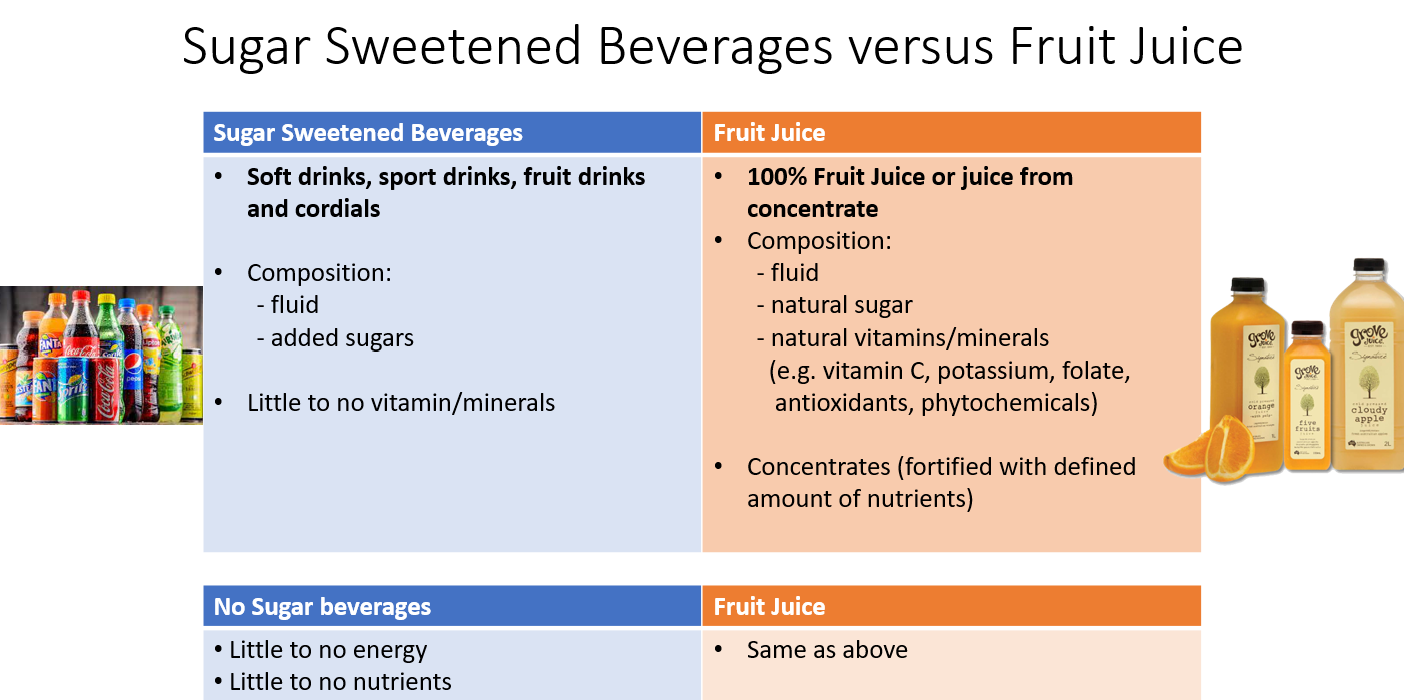 Sugar sweetened beverages are those that have sugar added when they are produced. These include soft drinks, energy drinks, fruit drinks, sports drinks and cordials. The types of sugar which can be added include fructose, sucrose, and brown sugar. Sugar sweetened beverages are high in kilojoules and can lead to weight gain and obesity if consumed in large quantities. Obesity is the leading risk factor for type 2 diabetes, cardiovascular disease, and some cancers. Therefore, high consumption of sugar sweetened beverages can contribute to the development of chronic diseases.
Sugar sweetened beverages are those that have sugar added when they are produced. These include soft drinks, energy drinks, fruit drinks, sports drinks and cordials. The types of sugar which can be added include fructose, sucrose, and brown sugar. Sugar sweetened beverages are high in kilojoules and can lead to weight gain and obesity if consumed in large quantities. Obesity is the leading risk factor for type 2 diabetes, cardiovascular disease, and some cancers. Therefore, high consumption of sugar sweetened beverages can contribute to the development of chronic diseases.
There is a difference between sugar sweetened beverages and 100% fruit juice. Fruit juice is high in fructose, and this is the naturally occurring sugar in fruit. It is different to sucrose, as it is a simple sugar called a monosaccharide while sucrose is a complex sugar made from fructose and glucose molecules and is called a disaccharide. Fructose is also absorbed differently in the body. Fructose has a low glycaemic index whereas sucrose has a high glycaemic index and therefore, is absorbed slower in the body than sucrose (i.e., table sugar) which is absorbed faster. 100% fruit juice consumed in excessive quantities and when consumed with other high energy foods can also lead to obesity and contribute to the development of chronic disease due to a high overall energy intake.
The nutritional benefit of 100% fruit juice outweighs sugar sweetened beverages. 100% fruit juice provides a range of nutrients that are not found in sugar sweetened beverages. These nutrients include vitamin C, potassium, folate, antioxidants, and phytochemicals.
Sugar sweetened beverages produce more acid when the sugar combines with bacteria in the mouth and therefore should be followed by a glass of water. Sugar sweetened beverages are a discretionary food and should be consumed rarely, while 100% fruit juice is an occasional drink as outlined in the Australia Dietary Guidelines. Both these beverages should not be consumed by children. The overconsumption of free sugars, regardless of their food source, can cause an excess energy intake and therefore contribute to the development of chronic diseases. Choosing more nutritionally beneficial beverages such as 100% fruit juice at the recommended intake can provide better health outcomes compared to their counterpart.
The main fluid of choice to drink by everyone is water as it provides vital hydration. There are some population groups that would benefit from drinking 100% fruit juice for both energy and nutrients. These include athletes for sports recovery, nutrition support for poor food intake and the elderly for the prevention of malnutrition. This is due to their higher energy and nutrient requirements compared to the general population.
